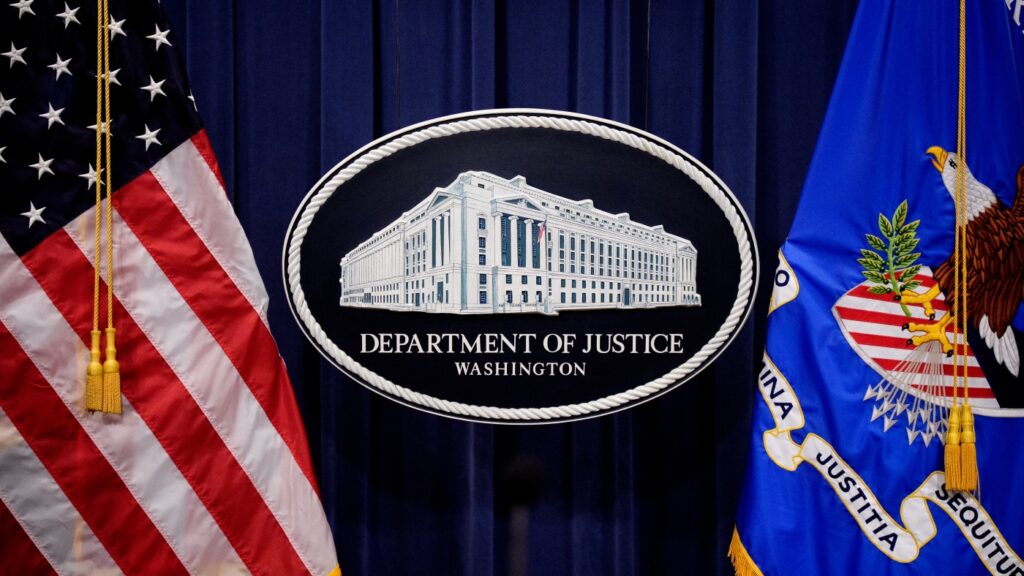
WASHINGTON, DC - MAY 6: The Department of Justice logo is displayed before U.S. Attorney General Pam Bondi arrives for a news conference at the Department of Justice on May 6, 2025 in Washington, DC. The Justice Department along with the Drug Enforcement Administration (DEA) and the U.S. Attorney's Office for the District of New Mexico are set to announce that they have completed an operation targeting a large drug trafficking organization that has been dealing fentanyl and other illicit narcotics. (Photo by Andrew Harnik/Getty Images)
The U.S. Department of Justice (DOJ) has announced a new initiative to prioritize cases aimed at revoking the citizenship of certain naturalized Americans. According to a memo released on June 11, the DOJ is directing its attorneys to focus on denaturalization efforts for individuals involved in specific criminal activities. This move targets the approximately 25 million naturalized citizens in the United States, raising significant concerns among immigration experts and civil rights advocates.
In a recent case, a judge ordered the revocation of citizenship for Elliott Duke, a U.K. native and American military veteran, following their conviction for distributing child sexual abuse material. This case highlights the DOJ’s renewed focus on denaturalization, a tactic with historical roots in the McCarthy era and expanded during previous administrations.
Historical Context and Legal Implications
Denaturalization, the process of revoking citizenship, was notably used during the McCarthy era to strip citizenship from individuals suspected of communist ties. The Obama administration later expanded its use, particularly through initiatives like Operation Janus, which targeted naturalization fraud. Under President Trump, denaturalization efforts intensified, with a focus on using civil litigation rather than criminal proceedings.
Assistant Attorney General Brett A. Shumate emphasized the importance of denaturalization in the DOJ’s enforcement priorities, stating,
“The Civil Division shall prioritize and maximally pursue denaturalization proceedings in all cases permitted by law and supported by the evidence.”
This approach has sparked debate over its constitutionality and potential impact on families of naturalized citizens.
Expert Opinions and Concerns
Legal experts have raised alarms about the DOJ’s strategy, particularly the use of civil litigation which does not guarantee legal representation for defendants. Cassandra Robertson, a law professor at Case Western Reserve University, argues that this approach violates due process and the 14th Amendment.
“Stripping Americans of citizenship through civil litigation infringes on the rights guaranteed by the Constitution,”
she said.
Conversely, Hans von Spakovsky of the Heritage Foundation supports the DOJ’s efforts, asserting that protecting the nation from criminals and terrorists justifies such actions. He contends that individuals subject to denaturalization can hire their own legal representation, dismissing concerns about due process violations.
Broader Criteria and Potential Impact
The DOJ’s memo outlines an expanded set of criteria for denaturalization, including national security violations and fraud against government programs. Sameera Hafiz, policy director at the Immigration Legal Resource Center, warns that this could create a “second class” of U.S. citizens, where naturalized individuals remain at risk of losing their citizenship.
Steve Lubet, professor emeritus at Northwestern University, points out the vague language in the DOJ’s guidance, which grants broad discretion to U.S. attorneys.
“Many of the categories are so vague as to be meaningless,”
he noted, expressing concern about the potential for arbitrary enforcement.
Case Study: Elliott Duke
The case of Elliott Duke illustrates the complexities and potential consequences of denaturalization. Duke, who became a U.S. citizen in 2013, was convicted of distributing child sexual abuse material prior to naturalization. The DOJ’s legal action against Duke, initiated in February, resulted in the revocation of their citizenship, leaving them effectively stateless.
Laura Bingham, executive director of the Temple University Institute for Law Innovation and Technology, warns that such cases set a dangerous precedent.
“Citizenship is not supposed to be something that you can continuously open up for some people, and you can’t for others,”
she said.
Looking Ahead
The DOJ’s denaturalization initiative raises critical questions about the future of citizenship rights in the United States. As the administration continues to redefine immigration policies, the implications for naturalized citizens and their families remain uncertain. Legal experts and advocates are closely monitoring the situation, urging transparency and adherence to constitutional protections.
For those affected by these developments, the path forward is fraught with legal and personal challenges. As the debate continues, the balance between national security and individual rights remains a contentious issue at the heart of American democracy.




